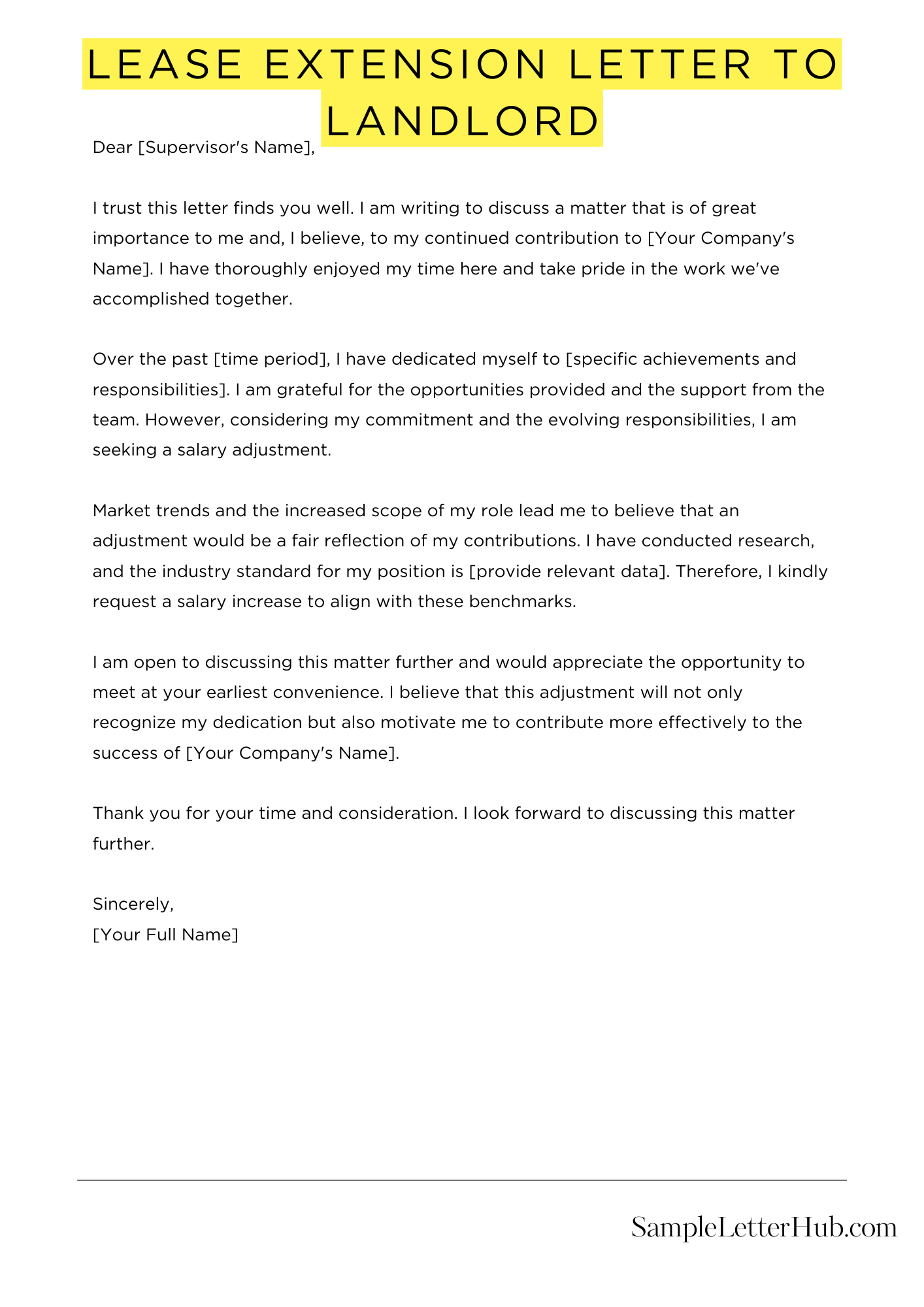A lease extension letter to landlord is a formal request to extend the lease agreement beyond its original end date. It’s a way to communicate your desire to continue renting the property and negotiate new terms with your landlord.
In this article, we’ll provide you with templates, examples, and samples of lease extension letters to help you draft your own. These samples will cover various scenarios and provide you with the necessary structure and language to effectively request a lease extension from your landlord.
Lease Extension Letter To Landlord
Dear [Landlord’s Name],
I am writing to request an extension of my lease for the property located at [property address]. My current lease expires on [lease expiration date], and I would like to extend it for an additional [number] years.
I have been a tenant in your property for [number] years, and I have always paid my rent on time and in full. I have also taken good care of the property and made several improvements, including [list of improvements].
I am requesting an extension of my lease because I am very happy with the property and the neighborhood. I am also committed to being a long-term tenant.
I am open to discussing the terms of the lease extension, including the rent amount and any other relevant details. I am confident that we can come to an agreement that is fair to both parties.
Thank you for your time and consideration. I look forward to hearing from you soon.
Sincerely,
[Your Name]

How to Write a Lease Extension Letter to Landlord
Writing a lease extension letter to your landlord can be daunting, but it’s important to approach it strategically to increase your chances of success. Here’s a comprehensive guide to help you craft an effective letter:
1. Start with a Formal Introduction
Begin your letter with a formal salutation, such as “Dear [Landlord’s Name].” Clearly state your name and the address of the property you’re renting.
2. Express Your Intent to Extend
State your intention to extend your lease and the proposed duration of the extension. Be specific about the start and end dates of the extended lease term.
3. Provide Reasons for Extension
Explain your reasons for requesting an extension. This could include personal circumstances, business needs, or any other relevant factors.
4. Offer a Fair Rent Increase
If you’re willing to pay a higher rent in exchange for the extension, state your proposed increase. Research comparable rentals in your area to determine a fair market value.
5. Address Landlord’s Concerns
Anticipate any potential concerns your landlord may have and address them proactively. For example, if you’ve had any issues with the property, explain how you’ve resolved them.
6. Request a Meeting
Suggest a meeting to discuss the extension in person. This allows both parties to clarify any questions and negotiate the terms.
7. Close with a Professional Tone
End your letter with a polite and professional tone. Thank your landlord for their time and consideration, and express your hope for a mutually agreeable outcome.
FAQs about Lease Extension Letter To Landlord
What is a lease extension letter?
A lease extension letter is a formal request from a tenant to their landlord to extend the term of their current lease agreement. It outlines the tenant’s reasons for requesting the extension, the proposed new lease term, and any other relevant details.
When should I send a lease extension letter?
It’s generally recommended to send a lease extension letter at least 60-90 days before the current lease expires. This gives the landlord ample time to consider the request and respond.
What should I include in a lease extension letter?
A lease extension letter should include the following information:
- Your name and contact information
- Your landlord’s name and contact information
- The address of the leased property
- The current lease term and expiration date
- The proposed new lease term
- Your reasons for requesting the extension
- Any other relevant details, such as proposed changes to the rent or other lease terms
How do I negotiate a lease extension?
Once you’ve sent your lease extension letter, you may need to negotiate with your landlord to reach an agreement. Be prepared to discuss your reasons for requesting the extension, and be willing to compromise on the new lease term or other lease terms.
What if my landlord doesn’t agree to my lease extension request?
If your landlord doesn’t agree to your lease extension request, you may have to consider other options, such as finding a new place to live or negotiating a month-to-month lease.

